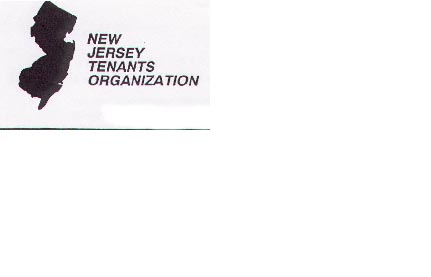PRESS RELEASE
96 Linwood Plaza, #233, Fort Lee, NJ 07024
Email: njto11@verizon.net website: www.njto.org
Telephone: (201) 342-3775 Fax: (201) 342-3776
FOR IMMEDIATE RELEASE
New Jersey Tenants Organization (NJTO)
The nation's oldest and largest statewide tenants organization.
For further information, call Matt Shapiro
FOR IMMEDIATE RELEASE
(for more information, call Matt Shapiro)
–––––––––––––––––––––––––––––––––––––––––––––––––––––––––––––––
Governor Signs Tenant Legal Fee Equality Bill
Major Victory for New Jersey Tenants Organization
About an hour before the noon deadline on January 21, 2014, Governor Christie signed S-2018, which had passed the Assembly and Senate by large majorities. The bill, sponsored by Senator Brian Stack (D-33) and Assemblyman Craig Coughlin (D-19), gives tenants the right to collect lawyer's fees and costs from landlords when they are successful in court if the landlord has reserved the same right in the lease. The new law applies to all leases entered into on or after February 1, 2014.
According to Matt Shapiro, President of the New Jersey Tenants Organization (NJTO), this new law is the most important advance in tenants' rights in many years. "New Jersey has some of the best tenants' rights laws in the country, but, until now, not when it came to these unfair legal fees," said Shapiro. "Nearly every lease in the state has one of these clauses giving the landlord the right to sue for legal fees and costs in addition to whatever else he's suing for, but it's been a one-way deal." The leases, written by the property owners, do not grant the same right to the tenant who hires a lawyer and wins in court, and the tenant has little or no bargaining power when signing a lease. Effectively, the successful tenant still loses because of the expensive lawyer's fee.
The one-way legal fees can be very intimidating to tenants, even when the lawsuit against the tenant is groundless. If the tenant with a really good case cannot afford competent legal counsel, they fear not only losing, which could mean eviction, but also having to pay the landlords's legal fees. It makes tenants think twice before joining or organizing a tenants' association or making a good faith complaint to the landlord or a public official.
The new law levels the playing field, following the example of many other states that have similar two-way requirements. "But our new law is actually better than the laws in other states, because it requires tenants to be informed of their new right to legal fees using bold print right in the same lease clause that gives that right to the landlord," stated Shapiro. "That's a big advantage, since tenants in the other states often do not know they can collect legal fees when they win. It's critical that tenants be aware of their rights."
The grassroots battle NJTO waged for this new law took nearly a year and a half, with most of the action between last March and now. It was rather heated, and the bill was amended many times in the process. It actually passed the Senate three times and the Assembly twice in different forms. "I tip my hat to the New Jersey Apartment Association (NJAA)," said Shapiro, "because, in the end, they agreed to reasonable compromise language on the last issue that divided us, allowing the bill to be passed and signed." The NJAA is the major organization representing landlords in New Jersey.
The NJTO is a membership-based advocacy group that has successfully fought for the rights of tenants in New Jersey for the last 44 years. For more information, see their website at www.njto.org.
Shapiro concluded "Now tenants will finally have a fair shot at having their day in court."
#
